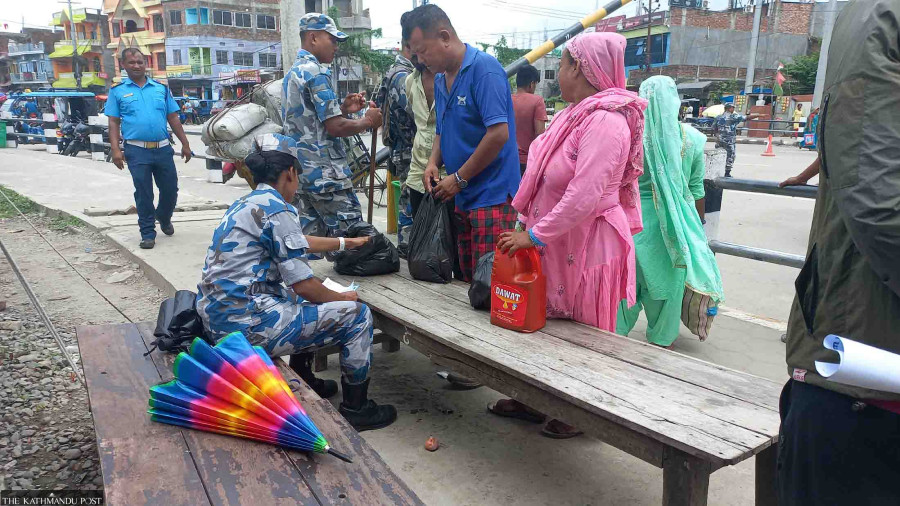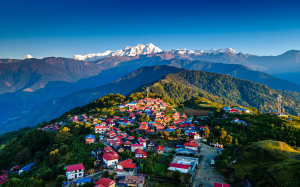Money
Border shoppers moan at end of duty-free system
Officials say the new rule has been enforced to discourage illegal cross-border trade and promote local businesses.
Deo Narayan Shah, Madhav Dhungana & Manoj Poudel
Gita Devi Ram of Katahari Rural Municipality, Morang had hopped across the border to do some household shopping in Jogbani, India on Monday.
When Ram returned, she was pounced upon by personnel of the Armed Police Force at Rani Customs, Biratnagar who ransacked her bag.
After arguing with her for a few minutes, the police personnel told her to pay customs duty on the goods she had brought from India or they would be confiscated.
“I had bought a saree, two vests and some household items like a packet of washing detergent and coriander seeds,” said Ram.
She was charged Rs185 as customs duty for the clothes, and told to take the other goods back to India.
“The policemen told me to return the household goods to the shop from where I had bought them,” said Ram. “The shopkeeper won't take back the goods.”
After suffering three hours of harassment and pleading with different officials, she finally managed to take the goods home.
People in Morang and neighbouring districts regularly visit the markets in Jogbani to purchase clothes and other necessities because they are cheaper there. Visitors from Pokhara and Kathmandu also dash across the border to do some shopping when they are in the neighbourhood.
According to customs officials, more than Rs50 million worth of goods enter Nepal this way daily, but import duty is not levied on them.
Since the start of the new fiscal year on Monday, the customs office has prohibited shoppers from bringing goods worth more than Rs100. Duty will be levied on anything over that.
Nagesh Koirala, mayor of Biratnagar Metropolitan City, said that the new rule has been enforced to collect revenue because hundreds of locals purchase goods from the Indian markets daily.
“If such cross-border purchases aren’t checked, it may affect the business of local traders,” said Koirala.
Locals have accused traders and government officials of creating unnecessary hassles.
“The customs officials have taken undue benefits from local traders and created the new rule,” said Ram Prasad Bastola, a resident of Biratnagar.
“Traders have jacked up prices in Nepal after the new rule was enforced. But there is no market monitoring.”
Gyanendra Raj Dhakal, chief of the Biratnagar Customs Office, said they introduced the new rule in coordination with Biratnagar Metropolitan City to discourage illegal cross-border trade and promote local businesses.
“Moreover, food products cannot be brought from India without fulfilling quarantine regulations because of potential health hazards,” said Dhakal.
The new rule has been enforced in the south-western Tarai too. Until a few months ago, hundreds of locals from Kapilvastu and Rupandehi used to travel to markets in Sunauli, India to buy goods.
Markets in Indian border towns have always bustled with Nepali buyers. From dawn to dusk, shoppers throng the markets filling the roads with rickshaws, motorcycles and other vehicles.
After the Bhairahawa Customs Office started levying import duty on goods worth more than Rs100 from April 26, the number of cross-border shoppers has plunged.
According to customs officials, the number of shoppers has dropped from 500 daily to around 50.
“Locals have stopped buying from the Indian market now,” said Mani Ram Poudel, chief of Bhairahawa Customs. “It has made a positive impact on the local economy.”
Locals are not happy with the new rule as they say it's impractical.
Local activist Bijaya Govind Shrestha said the new rule was necessary to control smuggling across the border. “But it is impractical to impose taxes on goods that people buy for their kitchen,” he added. “Import duty should be levied only on goods worth above Rs1,000 per person.”
Locals have also complained that Nepali shopkeepers increased the prices right after the new rule came into effect.
“Goods which used to cost Rs70 now cost Rs120,” said Asmita Ghimire, a local of Siddharthanagar-9, Rupandehi.
“When we asked why the prices had been increased, the shopkeepers said it was due to higher taxes.”
She accused local traders of profiteering in the absence of strict regulation by the concerned authorities.
“Some traders still bring goods via unofficial channels due to the porous border. They remove the price label so they can charge more,” Ghimire added.
Traders say that’s not true. Thakur Kumar Shrestha, president of the Siddhartha Chamber of Commerce and Industry, said that the new rule had become effective in controlling illegal trade.
“Now some people have been trying to defame the campaign by making false accusations,” said Shrestha. “Traders in India have been complaining to the Indian Embassy in Nepal.”
Deepak Thapa, Superintendent of Police of the Armed Police Force (APF) in Bhairahawa, said a large number of border security officials had been mobilised to patrol the border to prevent illegal movement of goods.
“The number of people buying goods has decreased significantly now,” said Thapa.
Chura Bahadur Sartungi, chief customs officer at the Suthauli Customs Office in Kapilvastu, said revenue collection came to Rs20,000 to Rs30,000 daily in the initial days.
But the customs duty now being collected from such buyers is less than one-fourth of what it was before.
“The new rule has affected daily wage earners as their cost of living has increased. But it's the government rule and everyone should follow it,” said Sartungi.
Girjesh Pandey, former chief of Yashodhara Rural Municipality, Kapilvastu, said that the new rule had become a burden to the people in the border villages.
“Many locals in the bordering areas have relatives in India, but the new rule prevents them from sending gifts,” said Pandey.
Manish Mishra, another local, said the government was squeezing the poor instead of collecting more taxes from big businesses and factories.




 16.16°C Kathmandu
16.16°C Kathmandu














